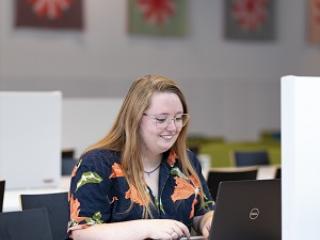Studying with a disability
Over 1,600 students at Tilburg University need some form of special arrangement or extra support because they have dyslexia, a functional impairment or chronic illness that can hinder their studies, making studying more difficult and consuming more time and energy.
Sometimes this is easy to see (someone is blind or rides in a wheelchair), but usually the functional impairment is not noticeable, for example in the case of dyslexia, AD(H)D, autism, Crohn's disease or a mental illness. To make studying easier for students with a disability, they can make use of special arrangements and facilities.
If a nominal pace of study is not feasible, you may discuss with your Education coordinator a modified schedule that will take you a little longer to complete your studies.
Some functional limitations in a row:
- Sensory impairments
- Motoric disabilities
- CANS/RSI
What facilities can you use if you have a disability?
What should you do if you need a special arrangement?
Step 1: Report your study delay
If you need adjustments in your education, or study at an adjusted pace, study delay is almost inevitable. Study delay has consequences for the binding study advice, for example, and can have financial consequences. It is therefore important to report your circumstances (disability) as soon as possible to the dean of students. Together with you, the dean of students will look at what can be done to help you study as well as possible, show you the way and inform you about the facilities and regulations available to you in your situation.
You can apply for special examination arrangements online yourself.
Step 2: Submit evidence
Please note that you will need to submit adequate documentation when you first apply for or report an illness or disability.
Check Supporting documentation in case of illness or special circumstances
More than 1,600 students have requested for support because they have dyslexia, a functional limitation or chronic illness that can hinder their studies. Sometimes a functional impairment is easy to see, but usually the impairment is not noticeable, for example in the case of dyslexia, ADD, ADHD, autism or a mental illness. There are facilities to facilitate studying.
Questions & contact
Questions on facilities in the campus buildings?
If you miss certain facilities or if buildings / lecture rooms are not accessible enough, please contact the coordinator 'studying without hindrance' Anita Mosterd. Together with you she can look for a possible solution or put you in contact with the right person.
Study choice and job market
For questions about study options and the job market, you can contact Student Career Services, but also ECIO, or the Swom foundation, which guides Young Professionals with an occupational disability in finding a full-fledged job that matches your talents and qualities.
Questions about sports at the Student Sports Centre
If you would like to play sports at the Student Sports Center, but you have questions about what is possible or you have a specific support request, please contact the Sports Manager, hansvandenheuvel@tilburguniversity.edu.
Together we will look for a solution.
Your opinion is important
Would you like to think about more inclusive education at Tilburg University? Sign up for the student sounding board group, connected to the working group ' Inclusive education' at a.i.mosterd@tilburguniversity.edu, coördinator ‘studying without hindrance’.
Online community of experience experts
Want to connect with fellow students about their experiences? Then sign up for the Online community for experts by experience. With this private LinkedIn group, higher education students with disabilities and support needs can connect with each other in an accessible way. In this way, they can inform each other about current developments and share tips, initiatives and meetings around inclusive education.
Working effectively
Working as effectively as possible is what everyone wants. Let's cut red tape together, lets be critical on our rules and optimize processes.
- Your input is the basis for improvement
- The goal is less red tape, less rules
- Resulting in more time for substantive work


